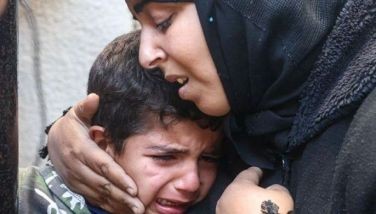EU leaders battle over budget at tough summit
BRUSSELS (AP) — European Union leaders defended their hard lines as they dragged a summit to decide EU spending for the next seven years into early Friday, laying bare deep divisions over the purpose of their union.
On one side, countries led by Britain are insisting that the EU has to make the same drastic cuts that member nations themselves are making in their own budgets as they weather the continent's economic and debt crises. They want tens of billions of euros slashed off the €1.03 trillion ($1.35 trillion) originally asked for by the European Commission, the EU's executive arm.
On the other, newer — and generally poorer — members see Europe as a club that is only as strong as its weakest member. Led by Poland and France, they argue that Europe means nothing if the budget isn't used to bridge the wealth gap and help restart growth.
Both sides are threatening to walk away from the table — again — if they don't get what they want. The first summit to negotiate a budget collapsed in November.
In a sign of how tough the fight Thursday night will be, leaders delayed the official start of the summit for nearly six hours as they huddled in smaller groups, trying to bridge their differences. The full meeting with all 27 leaders finally got under way just before 9 p.m. (3 p.m. EDT).
Luxembourg Prime Minister Jean-Claude Juncker warned that failure to reach an agreement at this meeting would "not send a good signal" as the union struggles to win back the trust lost during its economic crisis.
The 27-country EU, with a population of more than 500 million people and an annual gross domestic product of €12 trillion ($16 trillion), is the world's largest economy.
The EU budget, which is separate from the national budgets, is designed in part to balance out the economic development of the region by injecting funding into poorer countries. The EU has funded hundreds of thousands of infrastructure and capital projects over the years, from the installation of a broadband network to upgrading parts of the road network. It also sends development aid around the world, to places like Mali.
The budget includes items meant to generate economic growth in the future, such as research and development, increasing digitalization and creating a new, more accurate satellite navigation system. It also funds regulation and administration in such areas as mergers and competition, the review of national budgets to ensure they do not include excessive deficits, and — now — banking supervision.
As the talks began, the leaders were set to negotiate tooth and nail over an annual difference to the average European taxpayer of €20 ($27). The most generous budget proposal would cost the average taxpayer €295 ($400) a year; the most pared-down proposal would cost €275 ($373).
The EU's budget for 2012 is €147.2 billion ($199.4 billion) — less than one-fifth the size of the budget of the U.K. alone.
Juncker's advice aside, leaders staked out uncompromising positions before the meeting began.
"We have to make savings, but without weakening the economy," said French President Francois Hollande on his way into the summit in Brussels. "If Europe wants an agreement at all costs and abandons its common policies, I do not agree."
While France's economy is the EU's second-largest, it supports poorer countries and is a strong advocate for wealth-sharing. And France itself receives a significant amount of money in agricultural subsidies.
Most of the EU leaders came in with a national agenda in mind, and Czech Prime Minister Petr Necas said the proposals he had seen so far were "unfair." Since any deal needs unanimity, Necas threatened to use his veto.
Britain was also threatening to tank the talks.
"The European Union should not be immune from the sorts of pressures that we've had to reduce spending, find efficiencies and make sure that we spend money wisely, that we're all having to do right across Europe," said Prime Minister David Cameron, who said the numbers put forward in November were much too high.
The numbers "need to come down, and if they don't come down there won't be a deal," Cameron said.
In his opening speech, European Parliament President Martin Schulz raised the stakes even further, reminding the leaders that lawmakers have the right to reject the budget.
Schulz noted that a failure to reach a compromise would simply allow the current budget to roll over with an additional 2 percent for inflation — an outcome he said was workable.
In a late effort at compromise at an earlier meeting in November, European Council President Herman Van Rompuy proposed a budget of €972 billion ($1.25 trillion) — €21 billion less than the 2007-2013 budget.
A senior EU official has said that, while Van Rompuy is proposing an overall cut, some items within his proposed budget will grow, including an effort to combat youth unemployment.
Spending on programs meant to ensure future prosperity, such as research and development, education and innovation, will also grow in real terms, the official said. He spoke on condition of anonymity, in line with EU policies.
- Latest
- Trending































